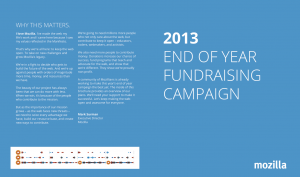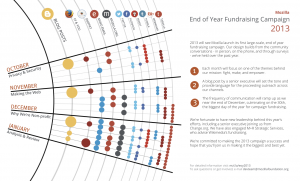This is the second of a two-part blog (see part I here)
Mozilla can apply what we’ve learned from digital grassroots organizing to help millions more people become web literate, and move from passive consumers to active citizens of the web. Here are three big opportunities:
Integrate grassroots advocacy into the Mozilla community. This means deeper investment in building our ground game for the web. Though the landscape could change, policy priorities and community interest intersect in the European Union and in India at the moment (on issues like net neutrality, data retention, surveillance). India is home to a very large number of people just coming online. It’s a tremendous opportunity for Mozilla to engage on net neutrality and web literacy — and what happens in India will influence how a huge % of the planet comes to understand the importance of these issues.
Invest in our email list so that we can mobilize at a moment’s notice. Right now, Mozilla has one of the largest email advocacy lists dedicated to web issues in the world. We can empower millions more people by engaging them via email. A global email list is a powerful weapon for protecting the largest public resource on the planet. It’s also an audience for other things Mozilla has to offer — including products and learning opportunities. Not all populations rely on email the same way — its usage isn’t universal. We also have to invest in non-email channels where needed.
Fill the information gap. “Online life” is quickly just melding into “life” and threats to that life mean more people are paying attention. in fact, we know from research that people are worried. How can I avoid phishing scams? How can I fight government overreach into my private data? What’s a good password look like? What can I do if my credit card is hacked online? How do I hide my search history? People want and need to know more about how to be good web citizens; how to be empowered and smart online. Yet, where’s the creative, clever, poignant, share-ready content to fill in the blanks? How do people get answers so they become confident web citizens?
What will it take?
Here’s where I recommend we focus some energy, and invest in tactical experiments:
Map an agile path for grassroots community building. I use “agile path” because we need to approach the challenge with a beginner’s mind. There’s a lot we don’t know about building a grassroots organizing infrastructure as Mozilla. How will Mozilla’s community respond to calls to action? Who will raise their hand to help build advocacy strategy in a given region, country, or city? What’s the best way to support local leaders? How do we listen to the community members telling us which issues should be priority for Mozilla? How do we partner with policy, brand, participation, communications, product and other teams who also care about community engagement?
Invest in email best practice and the best practitioners. This means as an organization we need to grasp the importance of a virtual community (such as an email list) as a living, breathing thing that needs careful care and nurturing. Right now this work is under-resourced and therefore under-performing in many respects. Peer organizations have staffs larger than ours managing email lists smaller than ours. Email list and community management is a skill, science, art, and craft and the very best at it are in demand (in a growing number of sectors). Better resourcing will lead to careful and smart engagement strategies that keep our community primed for calls to act on the things we all care about.
Invest in design and community-generated content. There’s been much written lately about how important design is to business — I would argue that design can also play a crucial role in the business of movement building. How can we make content with the right look and feel, in the right voice, delivered at the right moment?
Mozilla is like no other organization, and leaning into what makes Mozilla so special will yield incredible growth, and impact — we’ve seen it work for our nascent digital advocacy program. Leveraging our incredible community + building email capacity + investing in great content will help many more m(b)illions become web citizens — not just passive consumers.

 I’m sitting inside on this gray rainy Oakland, CA day flipping between Firefox browser tabs. One tab is Mozilla’s HR web portal where I am filing a “Qualifying Life Event” form to add my domestic partner, Nina, to my benefits plan. The other is a news feed about our new CEO, Brendan Eich. Another tab holds Facebook, where I’m putting up a defense against a load of vitriol aimed at Mozilla in my own news feed. I find myself in the bizarre position of defending a company led by a man who donated to support a campaign that hurt me and my family.
I’m sitting inside on this gray rainy Oakland, CA day flipping between Firefox browser tabs. One tab is Mozilla’s HR web portal where I am filing a “Qualifying Life Event” form to add my domestic partner, Nina, to my benefits plan. The other is a news feed about our new CEO, Brendan Eich. Another tab holds Facebook, where I’m putting up a defense against a load of vitriol aimed at Mozilla in my own news feed. I find myself in the bizarre position of defending a company led by a man who donated to support a campaign that hurt me and my family. Another example:
Another example: 






